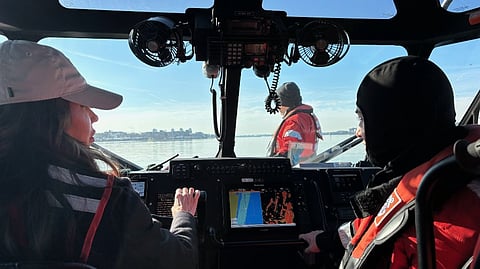FEATURE | US Coast Guard coordinates US aircraft disaster response on Potomac River
The US Coast Guard is coordinating with local, state and federal agencies in response to the aircraft collision which occurred Wednesday evening over the Potomac River in Washington
Scores of people are dead after an American Airlines regional passenger jet with 64 people on board and a US Army Black Hawk helicopter collided and crashed into the frigid Potomac River near Reagan Washington National Airport.
Officials did not provide a death toll from Wednesday night's collision but US Senator Roger Marshall of Kansas, where the flight originated, suggested most if not all those on board had been killed.
Jack Potter, the president and CEO of the Metropolitan Washington Airports Authority, said first responders were in "rescue mode".
American Airlines confirmed 60 passengers and four crew members were aboard the jet. The helicopter, on a training flight, was carrying three soldiers, a US official said.
CBS News, citing a police official, said at least 18 bodies had been recovered. Two sources told Reuters multiple bodies had been pulled from the water.
The midair collision occurred as the passenger jet, traveling from Wichita in Kansas, was on approach to land at Reagan. Radio communications between the air traffic control tower and the Black Hawk showed the helicopter crew knew the plane was in the vicinity.
The Pentagon said it was launching an investigation.
Webcam video of the crash showed the impact between the aircraft and the helicopter, and an explosion lighting up the night sky.
Rescue efforts
Among those on board were Russian former world ice skating champions Yevgenia Shishkova and Vadim Naumov, Russian state media reported.
So too were several US ice skaters, family members and coaches returning from a camp following figure skating championships in Wichita, governing body US Figure Skating said.
Washington DC fire chief John Donnelly said at least 300 first responders were continuing to work on the "highly complex" rescue operation.
"Conditions out there are extremely rough for the responders," Donnelly said. "It's cold. They're dealing with windy conditions."
Asked by reporters whether there were any survivors, he responded that, "we don't know yet."
Hypothermia is a concern for any possible survivors and first responders.
"At these frigid water temperatures, the human body’s core temperature quickly drops. Exhaustion or unconsciousness can occur in as little as 15 to 30 minutes," AccuWeather Senior Director of Forecast Operations Dan DePodwin said.
Response boat crews from Coast Guard stations Washington, Curtis Bay, Annapolis, St. Inigoes, Oxford and Crisfield have deployed to the incident to conduct searches in coordination with local partners and enforce a safety zone. Cutters Sailfish, Bruckenthal, Kennebec and Frank Drew are assisting.
An urgent marine information broadcast was issued regarding the incident and a safety zone established, securing all vessel traffic from the Woodrow Willson Bridge heading north along the Potomac River. Mariners are urged to avoid the area.
US Coast Guard pollution crews have mobilized and are pre-staged to respond to any pollution caused by the incident.
The coast guard is working with the Army Corps of Engineers and the US Navy’s Supervisor of Salvage and Diving to coordinate removing the wreckage and restoring the waterways once able to do so.
(Reporting by David Shepardson, Trevor Hunnicutt, Jamie Freed, Idrees Ali, Kanishka Singh, Jasper Ward, Rami Ayyub in Washington; Brad Brooks in Colorado; Joe Brock and Costas Pitas in Los Angeles; Writing by Brad Brooks; Editing by Ross Colvin, Gerry Doyle and Timothy Heritage)


